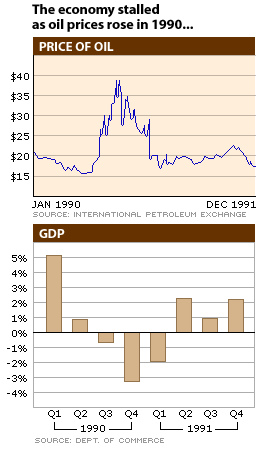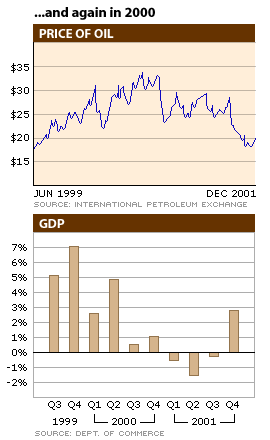NEW YORK (CNN/Money) - Oil prices are marching higher to the war drum's beat and so, too, are worries that the U.S. economy faces a new peril.
In the wake of a U.S. Navy warning Tuesday that al Qaeda may be planning attacks against tankers in the Middle East and a general heightened terror alert in the United States, oil prices lifted to their highest level since June, 2001, with crude for October delivery briefly rising above the $30-a-barrel mark -- nearly $10 above where it was at the start of the year -- on the New York Mercantile Exchange. With President Bush preparing to make his case before the United Nations Thursday for attacking Iraq, oil analysts expect that prices will go higher still.

Although output from Iraq has only an incidental effect on prices, and other producers have said they will keep the oil flowing, energy traders remember how Saddam Hussein lit even his own oil fields ablaze at the end of the Gulf War. They worry that in response to U.S. action against him he will strike out against Kuwaiti and Saudi Arabian fields, disrupting the world's energy supply.
"We're forecasting oil will grind higher up to $33," said Fimat USA's John Kilduff, "with an ultimate spike up to $40 a barrel on the outbreak of hostilities."
For an already-sluggish economy, such a move would hardly be welcome. Higher energy prices are, effectively, a tax on consumers and businesses -- cash that might have otherwise gone toward buying, say, a new washing machine, ends up in the gas tank of the family car. Lehman Brothers estimates that a $10 per barrel rise in oil, if sustained, knocks somewhere between a quarter and half a percentage point off of GDP annual growth.
More worrisome, over the last 30 years the U.S. economy has fared poorly whenever energy prices have moved significantly higher -- even when, as with the Gulf War and again in late 2000, the jump was relatively brief.
"It may be just a coincidence," said Morgan Stanley economist Bill Sullivan, "but all recessions since the 1970s have been associated with higher energy costs."
The base case on oil is that any spike is short-lived: It will be quickly proven that Saddam Hussein does not have the ability to strike out against other countries' oil production, that countries like Saudi Arabia -- which oppose action against Iraq -- nonetheless really will keep pumping oil, and that non-Arab producers like Russia will step up output as well.
Tom Petrie, CEO of the energy investment bank and research firm Petrie Parkman, suspects there could be a similar price move to the one seen around the time of Iraq's invasion of Kuwait in 1990 and the Gulf War in 1991. Oil had briefly surged to over $40 a barrel by October 1990, only to dive right back.
On Jan. 17, 1991, the day allied forces first struck against Iraq, the price of oil fell from $30.20 a barrel to $19.70.
"It was probably the biggest one-day move down in oil prices the world has ever seen," said Petrie. But by then it was too late for the economy -- it had shifted into recession in October.

Most economists believe that this time around the economy could handle a brief jump in prices. Back in 1990, arguably, the country was already headed into recession, and with just about everybody overestimating Iraq and worrying about a protracted war, consumers and businesses threw a damper on spending.
More recently, the run up in prices in the fall of 2000 heralded the recession, but given the excesses that developed during the stock market bubble it seems that a downturn was inevitable regardless of what oil was doing.
More important, even though the spikes in energy prices in both those cases were brief, nobody had any way of knowing they wouldn't last a long time -- particularly leading into the Gulf War. Concern that higher prices would persist got built into consumer and business expectations, and as a result spending plans were curtailed. In the current environment, because of the previous experience with the Persian Gulf War, the expectation is that higher prices won't last long, so the effect on spending patterns will be muted.
"If your period of turbulence is less than two or three months," said Deutsche Bank economist Cary Leahey, "then we can probably avoid a downturn."

|

